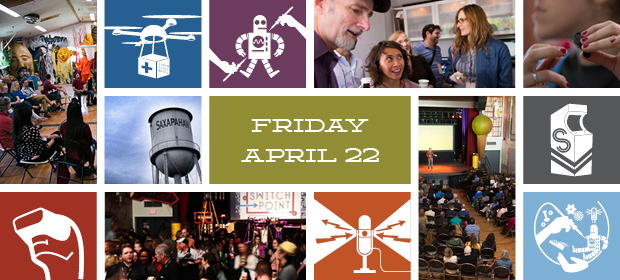Where We Work
See our interactive map


SwitchPoint has always protested the status quo. It's known for breaking apart the usual way of doing things in international development and entrepreneurship. This year, though, it protested more than that.
Psst: Did you miss day 1 of SwitchPoint 2016? Here's a recap.
It was bound to come up.
After all, plenty of the hundreds of people who gathered in Saxapahaw this week for SwitchPoint 2016 had never been to North Carolina. Some had never been to the United States. But they sure had heard of our state recently—North Carolina’s infamous bathroom bill made sure of that.
So it was only appropriate that the second and final day of the conference began with some words from Raleigh’s self-described rabble-rousers, Tina Haver Currin and Grayson Haver Currin.
“One morning I woke up and had an idea, and I thought it was a pretty good idea,” Grayson told the crowd. “I said, ‘Tina, what if we get all our friends to buy air horns and go blow them in front of the governor’s mansion until they run out of air?'”
This theme of emerging change-makers came up again and again throughout SwitchPoint.
The Currins wanted to do something about this discriminatory law, and to update the way their generation protests at the same time. The resulting Air Horn Orchestra was covered by local media and even the New York Times. It was a new kind of protest, moving away from the typical songs and signs. Their style leans toward the light-hearted, but the issues they tackle are anything but.
For instance, calls to transgender suicide hotlines have spiked since the bill passed a few weeks ago, they said. Among other troubling effects, the bill has exacerbated this public health concern for the state. The Currins and their friends are working to change that.
And More New Ways to Do Things that Matter
“It’s always good to start the day with some humor and dissent,” said Jessica Mack as she took the stage and launched into a discussion of the “rising crew of global badasses” that make up the Global Health Corps, a leadership development organization that places exceptional young fellows with nonprofit organizations and government agencies around the world.(We work with several Global Health Corps fellows every year here at IntraHealth International, and can vouch for their badassery.)
What can you make? What can you change? And whom will you team up with to do it?
This theme of emerging change-makers came up again and again throughout the day at SwitchPoint. Speakers covered 3-D printing and design prototyping. New ways to teach and tell compelling stories online. Using virtual reality to train humanitarian workers for complex emergencies. How the US Agency for International Development is changing the way it does things to incorporate more human-centered design.
They talked about contraception and vasectomies, poetry and partnerships. And they asked some big questions: Why are you here? What can you make? What can you change? And whom will you team up with to do it?
Why Aren’t You Here?
While SwitchPoint always draws a good crowd—picture a few hundred global health experts, entrepreneurs, techies, and others assembled happily in the Haw River Ballroom. But there were about 40 people missing from the crowd this week, Heather LaGarde said. These are folks who wanted to come, but couldn’t because of travel bans to North Carolina from their companies.
It was a sad announcement, especially during an event that’s always been dedicated to solving real-world problems of all kinds, and of promoting health and equity around the world.
“I invite you all—in your own little way, in your own little corner—to join me in making a difference in the world,” said Dayo Olakulehin during his talk today. He’s a Nigerian physician and inventor, and his own way was by creating the D-Box, an affordable, battery-powered ventilator that could revolutionize intensive care in low-resource health facilities throughout Africa. But it sums up the essence of SwitchPoint nicely.
By bringing together smart, dedicated people who are working in their own little corners to make the world a better, healthier place, SwichPoint has always protested the status quo. It looks to break apart the usual way of doing things in international development and entrepreneurship.
This year, though, I think it protested more than that.See the full SwitchPoint program here.
Also read:
Get the latest updates from the blog and eNews




